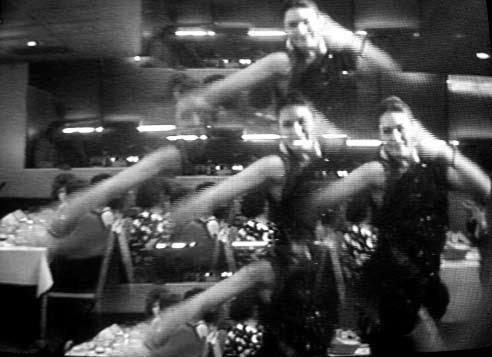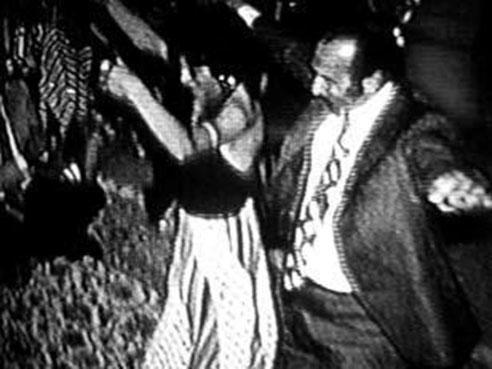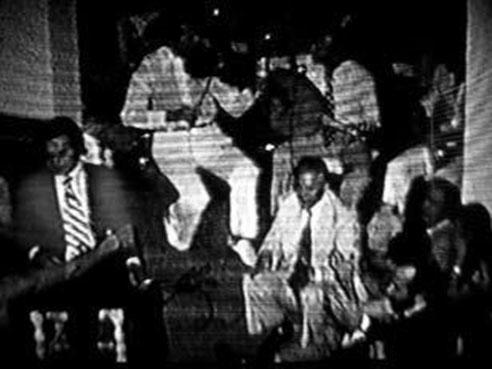
The website TuningBaghdad.net archives the lives and works of Iraq’s celebrated Jewish musicians and singers — men and women who were acknowledged in their day as stewards of Iraq’s finest musical tradition, testaments to the antediluvian moment before the beginnings of interfaith strife in the Middle East.
As ethnomusicologist Yeheskel Kojaman recalls, in The Maqam Music Tradition of Iraq, “They were the musicians of the Iraqi people. In 1932… all the instrumentalists who attended the first Arabic music congress in Cairo were Jews… When Iraq Radio was first established in Iraq in 1936, the entire instrumental ensemble, apart from the percussion player, was Jewish.” The calamities of ensuing decades — the impact of ethnic and national jingoism, including Israeli Zionism and Iraq’s persecution of its Jewish population, not to mention the all too familiar events defining contemporary life in Iraq — are woven on the site into the history of this group and the music they produced. So is the familiar, and ultimately reductive, insistence on a logic of “before” and “after,” a fall from grace.

Despite the somber historical backdrop, TuningBaghdad.net is very much about a present moment of listening and contributing. It would be a mistake to expect a meditation on the complex history of Iraqi-Jewish communities. Original video footage, audio clips, and links flesh out points of departure. These can’t really be described as “themes”; they serve rather to help define the musical form. They include the jam session, the transmission of technical expertise, the recollection and telling of histories, and the communal, musical gathering. Each link, clip, and bit of footage corresponds respectively to a chapter, including “Audiotopia,” “On the Maqam,” “Musicians in Iraq,” and “Life of the Party.” A short video clip introduces each chapter, framing its problematic. The relationships between the footage, the issues and the questions raised, and the constitutive “situation” are, however, less straightforward than one might imagine.
The site also provides links to a number of scholarly resources; Kojaman figures prominently. The overall tone, however, isn’t academic, but instead recalls the celebratory nature of the events and gatherings at which much of this music was performed. Visitors will find some chillingly beautiful tracks — for example, a maqam segah by Rashid Al-Qundarchi, recorded in early 1930s Baghdad. Prominent among the video clips is a compilation of home footage from the ’70s through today, introducing “Life of the Party.” The montage flashes images of crowded dance floors. Men of ample belly grin endearingly. Sexy big-haired ladies young and old make the scene. The joie de vivre is infectious.

Both the site’s content and its form reflect the logic of the chalghi, a music-fueled get-together and long-standing tradition that continues to serve an important role in Iraqi-Jewish diasporic life. The name originally referred to the ensemble of Jewish musicians hired to play at important gatherings, in coffeehouses, and on the radio. Regine Basha — curator and primary author of TuningBaghdad.net — is the daughter of Iraqi émigré and violin player Sol Basha and cites her childhood experiences of chalghis as an important catalyst for the project. Indeed, the site’s sensibility is that of a researched look back at cherished childhood memories of late-night and all-night communal social events. It seems to allow the viewer to curl quietly in the corner, dozing and waking to an endless stream of conversation, laughter, music, serious discussion, and tinkling glasses. The site might also embody the persona of the aficionado, hoarding bootleg tapes in shoe boxes and reveling in the ability to revisit these otherwise ephemeral performances.
Ultimately, TuningBaghdad.net aims to reflect the structure of a community and life reassembled in diaspora: a collective archival project, whose authors are many and physically dispersed, composed of traditions reassembled “out of context” and fueled by the need to research and articulate what before were personal experiences in the framework of “history.” To this end, Basha has designed the site as a permanent work in progress, attracting new material through independent submissions. Some of these are actively solicited from musicians, while word of mouth and the occasional magic-wand-wave of the internet search engine introduce newcomers with their own contributions to make. In this respect, the site must effectively engage an Iraqi-Jewish community to succeed. Other important interlocutors include contemporary musicians, artists, and musical historians, who may position themselves in relation to these traditions, whether or not they claim them as their own.

The art world not only provides the website with potential viewers, but also espouses concerns and structures that resonate with the model of a “living” or “diasporic” archive. The site seems to testify to the possibility of understanding the so-called international art world in diasporic terms: both are defined in relation to geographically disparate groups who identify with shared histories and cultural practices, who gather occasionally to celebrate and reaffirm values and traditions, and who are engaged in a project of self-representation; individuals whose lives and work are often presented as somehow displaced from their immediate context, communicating simultaneously with a community and discourse that can only ever be partially present; individuals who understand discussion and personal relationships as materials of transmission through which history, the structures of inheritance and influence, and standards of relevance are determined.
This attempted mapping represents, of course, my own glib gloss on both terms — “diaspora” and “international art world.” Some of these characterizations are familiar truisms; others strike me, as more or less verifiable truths; and still others come into view through the framework of TuningBaghdad.net. It is even possible to see this mapping as embedded within the project. Finally, it might be that the “diaspora” that would seem to be at the center of the project is colored by art world concerns that relate back most immediately to the art world itself. To some extent, the collaborative nature of TuningBaghdad.net’s incipient stages in art-world contexts acknowledges an overlap. Contemporary art constitutes an important framework for this meditation on the archive, and on the Iraqi-Jewish diaspora and its music. How, why, and if this should be the case now are important questions.
The website is the result of a long process of discussion and research, only a fraction of which is currently on view. Basha began her research while participating in the unitednationsplaza “exhibition as school” project in Berlin. Repeat trips to Israel and London produced around twenty-five hours of film and audio recordings, which Basha eventually used to create a radio program and series of audiovisual presentations in both Berlin and Mexico City. While TuningBaghdad.net offers something of that distance-granting perspective, perhaps the most valuable aspect of the archive is its proximity, or its resistance to abstraction. Rather than providing information, video and audio clips reveal relationships and nuances often not available in more self-consciously pedagogical forms. At one level, this has simply to do with the simultaneity of a performance and its reception, available only via video and audio footage. At another level, the organizing concepts of the site — “audiotopia,” “life of the party” — call for a poetic logic to substitute for the familiar chronological or geographical division of histories and art practices. Though it feels somewhat abstruse, this approach ultimately reveals more about a complex musical tradition — its history and contemporary context — than would otherwise be possible. It also allows the beauty of individual performances, as well as the immense charm of many of the musicians and their audiences, to shine through.